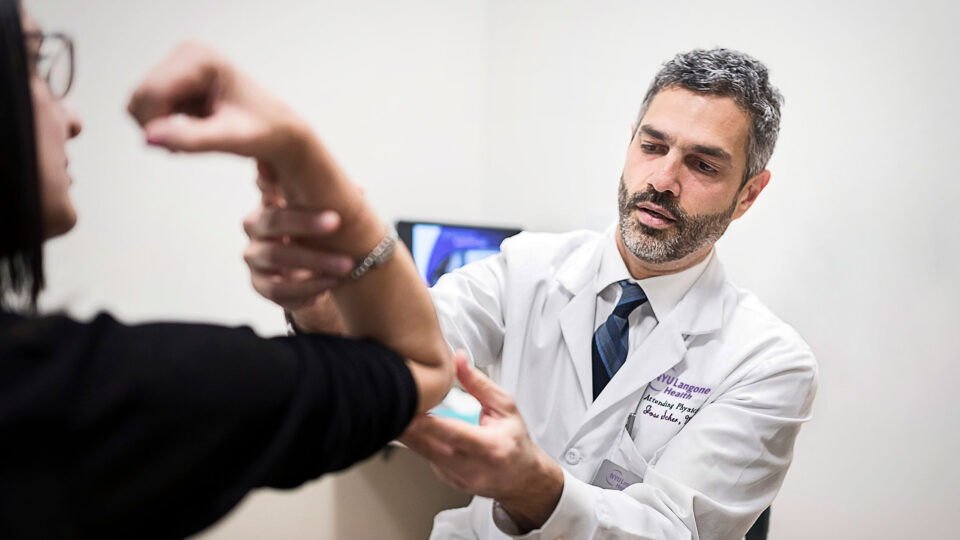Congenital heart block (CHB) is a key consideration when managing rheumatologic patients during pregnancy. The disorder complicates 2 percent of anti-Ro/SSA antibody-positive pregnancies and carries substantial perinatal morbidity and mortality. Almost all of the survivors require lifelong cardiac pacing. Data suggests ant-inflammatory treatment of primary and secondary (emerging) CHB can prevent progression to complete block, yet the optimal surveillance strategy to detect emergent conduction disease is unknown.
To investigate an at-home method in which pregnant women listen for rhythm abnormalities, Jill P. Buyon, MD, the Sir Deryck and Lady Va Maughan Professor of Rheumatology, is collaborating with Bettina Cuneo, MD, a professor of pediatrics and obstetrics at the University of Colorado. Their Surveillance and Treatment to Prevent Fetal Atrioventricular Block Likely to Occur Quickly (STOP BLOQ) trial, supported by the Eunice Kennedy Shriver National Institute of Child Health and Human Development, launched in 2020.
“As with other diseases, it is likely that timing is everything.”
Jill P. Buyon, MD
The multicenter trial is assessing whether anti-Ro/SSA-positive mothers can utilize doppler-based fetal heart rate monitoring (FHRM) at home to identify second degree block, and whether rapid treatment with dexamethasone and intravenous immunoglobulin can reverse the conduction defect. “As with other diseases, it is likely that timing is everything,” Dr. Buyon says.
At-Home Monitoring Enables Early Warnings
To date, the team has enrolled 158 patients. The trial is first stratifying anti-Ro/SSA-positive mothers, based on research conducted by Robert Clancy, PhD, professor of medicine, that evaluates the levels of anti-Ro60 and anti-Ro52 antibodies. Mothers with high titers—defined as being above or equal to the lowest titer obtained for 50 mothers with previous offspring with CHB—are instructed by video and personal interviews to perform FHRM. From 17 to 25 weeks of gestation, the mothers conduct FHRM three times per day in addition to undergoing weekly or biweekly fetal echocardiograms.
Mothers text the audio sounds to a central data site. For those FHRM results that the mothers deem abnormal, their texts are immediately sent to an on-call cardiologist for evaluation. If the results are considered abnormal, the mothers are referred for an emergency fetal echocardiogram within six hours.
Enrolled mothers have had good overall compliance with at-home FHRM so far, and early experiences have helped refine the trial methods, says Dr. Buyon.
After one mother reported difficulty using the monitor, concern over the potential for an abnormality prompted an early echocardiogram that showed tertiary block that was refractory to treatment. The results prompted additional teaching to help enrolled mothers improve their ability to conduct the at-home surveillance.
Successful Reversal After Early Detection
Another mother reported an abnormality based on her own monitoring that prompted an urgent echocardiogram confirming second degree block. Treatment was initiated within several hours and six days later the fetal heart rate had increased from 70 to 150 beats per minute, with most periods showing a normal sinus rhythm.
“That reversal after the abnormality was detected and treated in less than 12 hours is a remarkable milestone. It supports the importance of what this study is trying to accomplish,” Dr. Buyon says.
“Even at this early stage we are already learning a great deal about the impact of home monitoring and the empowerment of mothers to participate in their own care.”
Although the initial results are encouraging, Dr. Buyon cautions that the study is still in its early stages, with a goal of enrolling 1,300 patients over the next four years. “Even at this early stage we are already learning a great deal about the impact of home monitoring and the empowerment of mothers to participate in their own care,” Dr. Buyon says.






